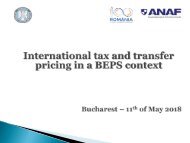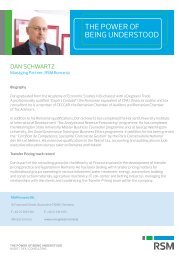6. Brexit and the Crown Dependencies - Lawrence Haar
Create successful ePaper yourself
Turn your PDF publications into a flip-book with our unique Google optimized e-Paper software.
BREXIT, THE CROWN DEPENDENCIES AND THEIR<br />
FUTURE IN INTERNATOINAL TAX MANAGEMENT<br />
January 2018<br />
Dr <strong>Lawrence</strong> <strong>Haar</strong>
Agenda<br />
1. Background <strong>and</strong> Facts<br />
2. The <strong>Crown</strong> <strong>Dependencies</strong> <strong>and</strong> <strong>the</strong> United Kingdom<br />
3. The Relationship with <strong>the</strong> EU<br />
4. The EU on Tax Harmonisation<br />
5. The <strong>Crown</strong> <strong>Dependencies</strong> as Tax Havens<br />
<strong>6.</strong> The EU on Taxation<br />
7. British Perspective on <strong>the</strong> Taxation<br />
8. Some Precedents<br />
9. <strong>Brexit</strong> Scenarios <strong>and</strong> <strong>the</strong> <strong>Crown</strong> <strong>Dependencies</strong> (CD)
Key Issues: <strong>Brexit</strong> & <strong>the</strong> <strong>Crown</strong> <strong>Dependencies</strong><br />
What opportunities <strong>and</strong> risks does <strong>Brexit</strong> create for <strong>the</strong> <strong>Crown</strong> <strong>Dependencies</strong>?<br />
From <strong>the</strong> perspective of <strong>the</strong> <strong>Dependencies</strong> what should <strong>the</strong> UK Government<br />
prioritize in its negotiations with <strong>the</strong> EU over its terms of exit?<br />
How will <strong>the</strong> constitutional position of <strong>the</strong> <strong>Crown</strong> <strong>Dependencies</strong> be affected by<br />
<strong>the</strong> UK’s departure from <strong>the</strong> EU?<br />
How effectively is <strong>the</strong> UK Government, <strong>and</strong> particularly <strong>the</strong> Ministry of Justice,<br />
engaging with <strong>the</strong> <strong>Crown</strong> <strong>Dependencies</strong> on <strong>Brexit</strong>?
THE CROWN DEPENDENCIES<br />
AND OVERSEAS TERRITORIES
Background<br />
The <strong>Crown</strong> <strong>Dependencies</strong> are not Member or Associate States of <strong>the</strong> EU but <strong>the</strong>y are part of<br />
<strong>the</strong> EU’s Customs Union, allowing <strong>the</strong>m to trade goods freely with Member States: this<br />
provision is made under Protocol 3 of <strong>the</strong> UK’s Act of Accession 1972.<br />
They are not covered by <strong>the</strong> EU’s o<strong>the</strong>r freedoms (services, capital <strong>and</strong> people). The Isl<strong>and</strong>s are<br />
also influenced indirectly by <strong>the</strong> EU, for example:<br />
• where laws in <strong>Crown</strong> <strong>Dependencies</strong> are based on (<strong>and</strong> intended to track) those in <strong>the</strong> UK, which in turn derive from EU<br />
legislation;<br />
• where exports to <strong>the</strong> EU require <strong>the</strong> <strong>Crown</strong> <strong>Dependencies</strong> to maintain equivalent st<strong>and</strong>ards to those of <strong>the</strong> EU; or<br />
• where <strong>Crown</strong> <strong>Dependencies</strong> voluntarily adopt EU st<strong>and</strong>ards.<br />
The <strong>Crown</strong> <strong>Dependencies</strong>’ formal relationship with <strong>the</strong> EU (including membership of <strong>the</strong><br />
Customs Union) will end with <strong>Brexit</strong> but it could be replaced by extension to <strong>the</strong>m of any new<br />
UK-EU agreement.
The <strong>Crown</strong> <strong>Dependencies</strong><br />
The <strong>Crown</strong> <strong>Dependencies</strong> of Jersey, Guernsey, <strong>the</strong> Isle of Man <strong>and</strong> Alderney are three isl<strong>and</strong> territories off <strong>the</strong><br />
coast of Britain are self-governing possessions of The <strong>Crown</strong>.<br />
They do not form part of ei<strong>the</strong>r <strong>the</strong> United Kingdom or <strong>the</strong> British Overseas Territories.<br />
Internationally, <strong>the</strong> dependencies are considered "territories for which <strong>the</strong> United Kingdom is<br />
responsible", ra<strong>the</strong>r than sovereign states.<br />
They are not member states of <strong>the</strong> Commonwealth of Nations, however, <strong>the</strong>y do have relationships with <strong>the</strong><br />
Commonwealth, <strong>the</strong> European Union, <strong>and</strong> o<strong>the</strong>r international organisations <strong>and</strong> are members of <strong>the</strong> British–Irish Council.<br />
They are not part of <strong>the</strong> European Union (EU) although <strong>the</strong>y are within <strong>the</strong> EU's customs area.<br />
As <strong>the</strong> <strong>Crown</strong> dependencies are not sovereign states, <strong>the</strong> power to pass legislation affecting <strong>the</strong> isl<strong>and</strong>s<br />
ultimately rests with <strong>the</strong> government of <strong>the</strong> United Kingdom.
EU licences)<br />
All<br />
All<br />
Border controls<br />
Financial<br />
services<br />
Retention of <strong>the</strong> Common Travel Area (CTA), allowing travel between <strong>the</strong> UK, <strong>the</strong> <strong>Crown</strong> <strong>Dependencies</strong><br />
<strong>and</strong> Irel<strong>and</strong> with minimal border controls<br />
Protection from blacklisting by <strong>the</strong> EU, where some Member<br />
States have shown hostility to <strong>the</strong> <strong>Crown</strong> <strong>Dependencies</strong>,<br />
when <strong>the</strong> UK exits <strong>the</strong> EU. Financial Services is key to <strong>the</strong>ir<br />
central economic sector<br />
Jersey <strong>and</strong> Guernsey Fisheries Clarity on <strong>the</strong> future of territorial waters (<strong>and</strong> protection <strong>the</strong>reof), which involves France<br />
All<br />
Fisheries<br />
Clarity on <strong>the</strong> future of <strong>the</strong> UK’s fisheries management, possibly absent EU quotas, <strong>and</strong> any implications<br />
for <strong>the</strong> <strong>Crown</strong> <strong>Dependencies</strong><br />
Minimal barriers to exports to <strong>the</strong> EU (<strong>the</strong> major buyer for most of <strong>the</strong> Isl<strong>and</strong>s’ fisheries produce)<br />
All Immigration Continued ability to fill demographic <strong>and</strong> skills gaps<br />
Guernsey <strong>and</strong> <strong>the</strong> Isle of Man Manufacturing Minimal barriers to exports to <strong>the</strong> EU<br />
Guernsey (Alderney) <strong>and</strong> <strong>the</strong><br />
Isle of Man<br />
All<br />
Online gambling<br />
Relationship with <strong>the</strong> UK<br />
Protection from any hostile action by <strong>the</strong> EU to this growing economic sector when <strong>the</strong> UK is not in <strong>the</strong> EU<br />
Preserving existing constitutional, trading <strong>and</strong> o<strong>the</strong>r relationships (including on customs <strong>and</strong> excise) with<br />
<strong>the</strong> UK<br />
Jersey <strong>and</strong> Guernsey<br />
Relationship with <strong>the</strong> UK<br />
Ending treatment of Isl<strong>and</strong> residents as non-UK, non-EU or non-EEA for <strong>the</strong> purposes of some UK services<br />
(including healthcare <strong>and</strong> higher education)
UK Commitment to <strong>the</strong> <strong>Dependencies</strong><br />
The UK Government is responsible for <strong>the</strong> <strong>Crown</strong> <strong>Dependencies</strong>’<br />
international relations.<br />
In 2007-08, it agreed with Jersey, Guernsey, <strong>and</strong> <strong>the</strong> Isle of Man a framework for developing<br />
that territory’s international identity, which explicitly recognized that interests might not<br />
coincide. This codification of <strong>the</strong> constitutional relationship included commitments that:<br />
• The UK will not act internationally on behalf of a <strong>Crown</strong> Dependency without prior<br />
consultation.<br />
• The UK recognizes that <strong>the</strong> interests of a <strong>Crown</strong> Dependency may differ from those of <strong>the</strong> UK,<br />
<strong>and</strong> <strong>the</strong> UK will seek to represent any differing interests when acting in an international<br />
capacity. (viz. <strong>the</strong> relationship with <strong>the</strong> EU under Protocol 3 of Accession.)<br />
• The UK <strong>and</strong> a <strong>Crown</strong> Dependency will work toge<strong>the</strong>r to resolve or clarify any differences<br />
which may arise between <strong>the</strong>ir respective interests.
“There is no current suggestion of any divergence between <strong>the</strong> UK’s <strong>and</strong> <strong>the</strong> <strong>Crown</strong><br />
<strong>Dependencies</strong>’ interests in relation to <strong>Brexit</strong> negotiations. If one were to arise, it may<br />
well be h<strong>and</strong>led satisfactorily in <strong>the</strong> terms that <strong>the</strong> Government has laid out to us.<br />
However, <strong>the</strong> current approach does not guarantee this, <strong>and</strong> is unclear in ways that<br />
might become unhelpful to <strong>the</strong> Isl<strong>and</strong>s. The UK is likely to follow <strong>Brexit</strong> with a series of<br />
major trade talks with potential implications for <strong>the</strong> <strong>Crown</strong> <strong>Dependencies</strong>,<br />
demonstrating that <strong>the</strong>ir need for effective engagement <strong>and</strong> representation in<br />
international affairs will continue to be pressing after <strong>the</strong> UK leaves <strong>the</strong> EU. We<br />
recommend that, in its response to this report, <strong>the</strong> Government clarify its position on<br />
representing any of <strong>the</strong> <strong>Crown</strong> <strong>Dependencies</strong>’ interests that differ from <strong>the</strong> UK’s own in<br />
<strong>Brexit</strong> negotiations <strong>and</strong> <strong>the</strong>reafter.”
The <strong>Dependencies</strong> <strong>and</strong> <strong>the</strong> EU<br />
Certain aspects of membership of <strong>the</strong> European Union apply to <strong>the</strong> <strong>Crown</strong><br />
dependencies, by association of <strong>the</strong> United Kingdom's membership. For<br />
example, Article 355 (5)(c) of <strong>the</strong> Treaty on <strong>the</strong> Functioning of <strong>the</strong> European<br />
Union (TFEU) states:<br />
• The Treaty shall apply to <strong>the</strong> Channel Isl<strong>and</strong>s <strong>and</strong> <strong>the</strong> Isle of Man only to <strong>the</strong> extent necessary to<br />
ensure <strong>the</strong> implementation of <strong>the</strong> arrangements for those isl<strong>and</strong>s set out in <strong>the</strong> Treaty concerning<br />
<strong>the</strong> accession of new Member States to <strong>the</strong> European Economic Community <strong>and</strong> to <strong>the</strong> European<br />
Atomic Energy Community signed on 22 January 1972.<br />
By Protocol 3 to <strong>the</strong> UK's Act of Accession to <strong>the</strong> Community: There was an Act<br />
to make provision in connection with <strong>the</strong> enlargement of <strong>the</strong> European<br />
Communities to include <strong>the</strong> United Kingdom, toge<strong>the</strong>r with (for certain<br />
purposes) <strong>the</strong> Channel Isl<strong>and</strong>s, <strong>the</strong> Isle of Man <strong>and</strong> Gibraltar. [17 October 1972].
Relationship with <strong>the</strong> EU (cont.)<br />
Of <strong>the</strong> Four Freedoms of <strong>the</strong> EU, <strong>the</strong> isl<strong>and</strong>s take part in that concerning <strong>the</strong> movement of<br />
goods, but not those concerning <strong>the</strong> movement of persons, services or capital. The<br />
Channel Isl<strong>and</strong>s are outside <strong>the</strong> VAT area (as <strong>the</strong>y have no VAT), while <strong>the</strong> Isle of Man is<br />
inside it. Both areas are inside <strong>the</strong> customs union.<br />
Channel Isl<strong>and</strong>ers <strong>and</strong> Manx people are British citizens <strong>and</strong> hence European citizens.<br />
However, <strong>the</strong>y are not entitled to take advantage of <strong>the</strong> freedom of movement of people<br />
or services unless <strong>the</strong>y are directly connected (through birth, descent from a parent or<br />
gr<strong>and</strong>parent, or five years' residence) with <strong>the</strong> United Kingdom.<br />
The common agricultural policy of <strong>the</strong> EU does not apply to <strong>the</strong> <strong>Crown</strong> dependencies. Their<br />
citizens do not take part in elections to <strong>the</strong> European Parliament.
The <strong>Dependencies</strong> <strong>and</strong> <strong>Brexit</strong><br />
With <strong>the</strong> impending <strong>Brexit</strong> negotiations, <strong>the</strong> House of Lords has produced<br />
a report entitled "<strong>Brexit</strong>: <strong>the</strong> <strong>Crown</strong> <strong>Dependencies</strong>" which states <strong>the</strong> "UK<br />
Government must continue to fulfil its constitutional obligations to<br />
represent <strong>the</strong> interests of <strong>the</strong> <strong>Crown</strong> <strong>Dependencies</strong> in international<br />
relations, even where <strong>the</strong>se differ from those of <strong>the</strong> UK, both during <strong>the</strong><br />
<strong>Brexit</strong> negotiations <strong>and</strong> beyond." [45] In <strong>the</strong> Great Repeal Bill white paper<br />
published on 30 March 2017 <strong>the</strong> UK government states "The Government<br />
is committed to engaging with <strong>the</strong> <strong>Crown</strong> <strong>Dependencies</strong>, Gibraltar <strong>and</strong> <strong>the</strong><br />
o<strong>the</strong>r Overseas Territories as we leave <strong>the</strong> EU."[46]:ch.5
EU Agenda on Tax Harmonisation<br />
Despite a long history of reports <strong>and</strong> initiatives on <strong>the</strong> harmonisation of corporate<br />
income taxes within <strong>the</strong> European Union, <strong>the</strong> 15 EU countries still operate <strong>the</strong>ir own<br />
national corporate income taxes.<br />
However, <strong>the</strong> increasing integration of economic activity is placing greater pressures<br />
on <strong>the</strong>se corporate income taxes, as <strong>the</strong> companies whose profits are being taxed<br />
operate increasingly across national borders, both within Europe <strong>and</strong> beyond.<br />
Tax differentials may also be assuming greater importance in company decisionmaking,<br />
as o<strong>the</strong>r differences between countries within <strong>the</strong> EU diminish through <strong>the</strong><br />
adoption of a single currency within <strong>the</strong> Euro zone.
EU Agenda on Corporate Tax Harmonisation<br />
It is not surprising that proposals for greater co-ordination of corporate<br />
income taxes are back on <strong>the</strong> international policy agenda, notably through<br />
<strong>the</strong> development of <strong>the</strong> EU's Code of Conduct on business taxation.<br />
In fact, for <strong>the</strong> EU as a whole, revenues from taxes on corporate income<br />
have increased over <strong>the</strong> last 20 years, both as a share of GDP <strong>and</strong> as a share<br />
of total tax revenue.<br />
Although <strong>the</strong>re has been a downward trend in corporate tax rates, this has<br />
been accompanied by both a broadening of corporate tax bases <strong>and</strong> an<br />
improvement in underlying company profitability.
EU on Tax Harmonisation<br />
In economies that are open to trade <strong>and</strong> capital flows, a principal impact of taxes<br />
on corporate profits is to raise <strong>the</strong> required rate of return on investment <strong>and</strong> to<br />
encourage capital to migrate to more lightly taxed locations.<br />
The consequences of lower investment lessנ capital per worker, lower productivity<br />
<strong>and</strong> hence lower wages mayנ be as harmful for employment as taxes on labour<br />
income directly.<br />
In any case, much of <strong>the</strong> burden of taxes on corporate income is likely to be<br />
shifted away from <strong>the</strong> owners of mobile capital <strong>and</strong> onto relatively immobile<br />
workers, as a result of lower investment.
The EU on Tax Harmonisation<br />
Regardless of <strong>the</strong> Commission’s view, <strong>the</strong>re is an argument that <strong>the</strong> continued<br />
existence of separate corporate income taxes within <strong>the</strong> EU has<br />
disadvantages.<br />
It has been argued that <strong>the</strong> behaviour of governments competing to attract mobile forms of<br />
investment by offering lower corporate tax rates or special regimes favouring certain business<br />
activities may be undesirable although on <strong>the</strong> o<strong>the</strong>r h<strong>and</strong> it may encourage countries to have<br />
competitive tax regimes.<br />
It may be <strong>the</strong> case that investment is more mobile between countries within <strong>the</strong> EU than between<br />
EU <strong>and</strong> non-EU countries, leading to a collective but unequal gain from greater co-operation over<br />
corporate taxation within <strong>the</strong> EU.
The EU on Tax Harmonisation (cont.)<br />
The uneven distribution of <strong>the</strong> benefits presents a major obstacle to fur<strong>the</strong>r corporate tax<br />
harmonisation, at least so long as Member States retain a veto over tax matters.<br />
A fur<strong>the</strong>r concern relates to <strong>the</strong> behaviour of companies, which can exploit differences between tax rules <strong>and</strong> tax rates in<br />
different countries to reduce <strong>the</strong>ir tax bills. The interactions between imperfectly co-ordinated corporate income taxes<br />
present numerous opportunities for firms to benefit from perfectly legal forms of tax planning.<br />
Simple examples include <strong>the</strong> manipulation of transfer prices for transactions between affiliated companies, with <strong>the</strong><br />
effect of shifting profits from high-tax to low-tax jurisdictions, <strong>and</strong> intra-group borrowing <strong>and</strong> lending, with <strong>the</strong> effect that<br />
interest payments are deducted against corporate tax at a high tax rate in one country <strong>and</strong> taxed at a lower rate when<br />
received in ano<strong>the</strong>r country. These opportunities for tax avoidance result in lost revenues for governments <strong>and</strong> add to <strong>the</strong><br />
perception that corporate tax revenues are under threat.
“UK gov’t defends offshore jurisdictions’ zero corporate tax rate in Brussels”<br />
By: Jonathan Boyd | 08 Nov 2016<br />
The UK government on Tuesday was preparing to defend<br />
<strong>the</strong> corporation tax policies of such jurisdictions such as<br />
Jersey, Guernsey <strong>and</strong> <strong>the</strong> Cayman Isl<strong>and</strong>s at an Ecofin<br />
meeting in Brussels under EU pressure to label countries<br />
with zero corporation tax rates as “non cooperative” for<br />
purposes of blacklisting.<br />
One of <strong>the</strong> key measures proposed is a so-called Anti Tax<br />
Avoidance Directive, which would implement six legally<br />
binding anti-abuse measures which, <strong>the</strong> proposals state,<br />
“all Member States should apply against common forms<br />
of aggressive tax planning.<br />
Putting aside <strong>the</strong> potential implications of <strong>the</strong> UK being outside<br />
<strong>the</strong> EU following <strong>Brexit</strong> <strong>and</strong> what this means in terms of antiavoidance<br />
measures that are legally binding on <strong>the</strong> remaining<br />
EU27, <strong>the</strong> directive would aim “to create a minimum level of<br />
protection against corporate tax avoidance throughout <strong>the</strong> EU,<br />
while ensuring a fairer <strong>and</strong> more stable environment for<br />
businesses”.<br />
France <strong>and</strong> Germany were reported ahead of <strong>the</strong> latest<br />
meeting of <strong>the</strong> Economic <strong>and</strong> Financial Affairs Council to be<br />
pushing for a definition that would mean ex-EU jurisdictions<br />
adopting a zero corporation tax rate were <strong>the</strong>refore be in<br />
breach of <strong>the</strong> screening rules <strong>and</strong> should be put on an EU<br />
blacklist of countries that are deemed to be “non<br />
cooperative” in providing sufficient levels of financial<br />
transparency intended to combat financial crime.<br />
The official statement from Brussels notes that<br />
“agreement was reached at a meeting of <strong>the</strong> Economic<br />
<strong>and</strong> Financial Affairs Council, without discussion,”<br />
suggesting that <strong>the</strong> UK on this point agrees with o<strong>the</strong>r<br />
EU states on <strong>the</strong> need to push ex-EU jurisdictions into<br />
providing <strong>the</strong> automated tax information needed to<br />
identify <strong>the</strong> beneficiaries of any offshore funds.
Unitary Taxation….<strong>the</strong> Precedent<br />
• High court throws out tax appeal by Barclays.<br />
• By<br />
• James R. Kraus<br />
• Published<br />
• June 21 1994, 1:00am EDT<br />
• The U.S. Supreme Court has ended more than 17 years of litigation by<br />
ruling against Barclays Bank of London in a California tax dispute.<br />
• The court's ruling on Monday, by a 7-2 vote, upheld a California Supreme<br />
Court decision allowing <strong>the</strong> state to impose a so-called unitary tax on<br />
multinational corporations.<br />
• A unitary tax is based on a company's worldwide operations, according to<br />
a complex formula taking into account global revenues, payroll,<br />
employees, <strong>and</strong> volume of business within <strong>the</strong> state.
Wednesday 21 March 2018 12:00pm<br />
EU unveils new tax proposals aimed at tech giants to create<br />
"a level playing field" for all firms<br />
• The European Commission today unveiled proposals for new rules it<br />
said will ensure <strong>the</strong> fair taxation of tech giants, including a three per<br />
cent tax on certain digital revenues of major firms like Amazon <strong>and</strong><br />
Facebook.<br />
• It has drawn up a double-layered plan to reform rules to tax digital<br />
firms where <strong>the</strong>y make sales - regardless of where <strong>the</strong>ir physical<br />
presence is.<br />
• So, online firms will ultimately face contributing "at <strong>the</strong> same level" as<br />
traditional bricks <strong>and</strong> mortar companies, according to <strong>the</strong><br />
Commission. The first part of <strong>the</strong> proposal states <strong>the</strong> need for a<br />
major reform of <strong>the</strong> EU's corporate tax rules for digital business
Tax Avoidance Means Transparency<br />
British Overseas Territories<br />
Caymans, Bermuda <strong>and</strong> BVI face<br />
new corporate transparency<br />
laws (FT, 2-5-18)<br />
UK approves plans for public registers about company owners in<br />
overseas territories<br />
The government of <strong>the</strong><br />
British Virgin Isl<strong>and</strong>s<br />
has reacted angrily to<br />
<strong>the</strong> UK move © AP<br />
“Fewer dark corners for dirty money<br />
to hide. The House of Commons<br />
votes to require transparency in UK<br />
overseas territories.”<br />
3-5-2018 Financial Times
HOSTILE DIVORCE CLEAN BREAK AMIACABLE TRANSITION CHANGE OF HEART<br />
Talks collapse. Britain exits <strong>the</strong> EU<br />
with minimal transitional<br />
arrangements, losing most if not all<br />
preferential access to <strong>the</strong> EU single<br />
market. It sets out to become a lowtax,<br />
light-regulation magnet for<br />
global businesses — aggressively<br />
undercutting <strong>the</strong> EU.<br />
Relations between Britain <strong>and</strong> <strong>the</strong> EU are strained but solid enough to<br />
arrange a tariff transition, agree trade terms <strong>and</strong> ratify <strong>the</strong> deal in <strong>the</strong><br />
European Parliament <strong>and</strong> 38 national <strong>and</strong> regional assemblies.<br />
Talks are difficult but amicable; disruption is minimised;<br />
changes are phased. Britain remains part of <strong>the</strong> EU<br />
single market, but on adjusted terms.<br />
Britain invokes Article 50 of <strong>the</strong> EU treaties — known<br />
as <strong>the</strong> “exit clause” but pulls out of <strong>the</strong> formal process<br />
before it is complete, remaining a full member of <strong>the</strong><br />
EU.<br />
Britain rework its rules <strong>and</strong> tax<br />
system to attract global business<br />
<strong>and</strong> new lines of business for <strong>the</strong><br />
City with reverting to minimal World<br />
Trade Organisation trading terms as<br />
“a perfectly sound bottom line for<br />
<strong>the</strong> UK in <strong>the</strong> negotiations”.<br />
British financial services would lose <strong>the</strong>ir EU “passport” to sell products<br />
<strong>and</strong> raise funds throughout <strong>the</strong> single market <strong>and</strong> have only limited access<br />
in specific areas. Ra<strong>the</strong>r than full single market access, Mr. Davis has<br />
stressed <strong>the</strong> need to keep “tariff free” trade, something he believes <strong>the</strong><br />
EU will offer. “They depend as much on us, more on us actually, than we<br />
do on <strong>the</strong>m,” he said. Political goodwill on both sides would be required to<br />
see through a multiyear wait for ratification, <strong>and</strong> near continuous fur<strong>the</strong>r<br />
negotiations to cope with changes in UK or EU market rules.<br />
<strong>Brexit</strong> Britain is satisfied with more control over some<br />
policy areas, such as agriculture. Crucially, <strong>the</strong> EU<br />
allows an “emergency brake” that could restrict <strong>the</strong><br />
inflow of EU migrant workers in overloaded job sectors.<br />
In return, <strong>the</strong> UK forgoes almost all its influence on EU<br />
rules that it must follow. The financial services passport<br />
remains, but its value is eroded over time. Britain still<br />
contributes to <strong>the</strong> EU budget, but pays slightly less.<br />
This scenario rests on a counter-revolution in British<br />
politics. After talks Mrs. May or a future prime minister<br />
may fail to win voter approval for an exit deal ei<strong>the</strong>r in<br />
ano<strong>the</strong>r referendum or in a general election.<br />
Alternatively, EU politics may dramatically change,<br />
making <strong>the</strong> terms of EU membership, or some form of<br />
“associate membership”, look more appealing to<br />
Britain. Economic hardship in <strong>the</strong> wake of <strong>the</strong> <strong>Brexit</strong><br />
vote would be an important factor.<br />
EU officials recognise that <strong>the</strong> threat<br />
of a British light-touch business<br />
haven off <strong>the</strong> shores of continental<br />
Europe could lead <strong>the</strong> bloc to make<br />
concessions on trade. But while <strong>the</strong><br />
economics may work for <strong>the</strong> City,<br />
<strong>the</strong> rest of <strong>the</strong> country’s economy<br />
could suffer without a substantive<br />
trade deal with <strong>the</strong> UK’s biggest<br />
market.<br />
This scenario accommodates two political red lines: Britain’s need for<br />
immigration controls <strong>and</strong> <strong>the</strong> EU’s allegiance to free movement <strong>and</strong> <strong>the</strong><br />
single market’s founding principles. Economics takes a back-seat to<br />
Politics. Focusing on a trade deal would curb how Britain can sell itself in<br />
<strong>the</strong> world economy. If <strong>the</strong> UK shows too much competitive independence<br />
from <strong>the</strong> EU — ei<strong>the</strong>r in regulation or tax — it would risk trade access<br />
terms <strong>and</strong> <strong>the</strong> ratification of any deal.<br />
Companies would also face years of uncertainty while <strong>the</strong> politics plays<br />
out. “If it takes a decade or more to sort this out <strong>and</strong> get clarity on trade,<br />
some businesses will ask some serious questions,” said Adam Marshall of<br />
<strong>the</strong> British Chambers of Commerce, adding that some would see <strong>the</strong><br />
upside of quickly cutting loose <strong>and</strong> “at least having certainty”. Transition<br />
arrangements are possible. EU officials have looked at a model where <strong>the</strong><br />
two sides mutually agree to not raise goods tariffs while a trade deal is<br />
completed. Services would be more vulnerable. The big questions is<br />
whe<strong>the</strong>r <strong>the</strong>y win [over] <strong>the</strong> British people once <strong>the</strong>y think about that <strong>and</strong><br />
if it is genuinely in <strong>the</strong> interests of <strong>the</strong> UK.”<br />
This is <strong>the</strong> preferred continuity option for big business<br />
<strong>and</strong> <strong>the</strong> City of London. There are two big potential<br />
flaws. The first concerns limitations to free movement.<br />
Britain must win concessions not only from promigration<br />
eastern Europe, but from France <strong>and</strong> <strong>the</strong><br />
Ne<strong>the</strong>rl<strong>and</strong>s, which do not want to set a precedent for<br />
anti-EU populists.<br />
The second issue is whe<strong>the</strong>r this would be enough for<br />
Britain. Some EU officials think compromise is possible,<br />
but only on carefully limited migration curbs. And <strong>the</strong><br />
UK would be a rule-taker on <strong>the</strong> single market, obliged<br />
to follow EU laws on everything from financial services<br />
to digital policy. Mr Vimont reckons losing <strong>the</strong> right to<br />
set rules would be an impossible sell for <strong>the</strong> British<br />
prime minister — control of free movement is<br />
regained.<br />
This is in <strong>the</strong> h<strong>and</strong>s of <strong>the</strong> political gods. As one senior<br />
British official said: “If we stay in <strong>the</strong> EU it will be by<br />
mistake.” Mrs. May has promised that “<strong>Brexit</strong> means<br />
<strong>Brexit</strong>” <strong>and</strong> it would be a brave politician to reverse<br />
course without a fresh voter m<strong>and</strong>ate. But this is a<br />
long, uncharted process. The option to remain in <strong>the</strong><br />
EU will probably remain well into late 2018 or 2019,<br />
even after Article 50 is invoked. By that point, Europe<br />
will have been through French, German, Dutch <strong>and</strong><br />
Austrian elections that could upend politics on <strong>the</strong><br />
continent. Sir Christopher Meyer, a former senior<br />
British diplomat, said: “This is a case where we hang<br />
loose, we trust in God, <strong>and</strong> we keep our powder dry,<br />
<strong>and</strong> we don’t take <strong>the</strong> decision until very near <strong>the</strong><br />
moment when we take <strong>the</strong> decision
SCENARIOS AND THE CROWN DEPENDENCIES<br />
Hostile Divorce<br />
Beneficial for <strong>the</strong> CD as <strong>the</strong>y are used to attract global<br />
business <strong>and</strong> finance.<br />
Clean Break<br />
Risk to <strong>the</strong> CD as putting Politics ahead of Economics means<br />
<strong>the</strong>ir interests are not prioritised.<br />
Amicable<br />
Transition<br />
Change of Heart<br />
Status quo ante <strong>and</strong> <strong>the</strong> activities of <strong>the</strong> CD are left<br />
unchanged. Perhaps some agreement with <strong>the</strong> EU reducing<br />
commitment to tax harmonisation <strong>and</strong> competition.<br />
GB returns to <strong>the</strong> fold as redeemed sinners but it requires a<br />
renewed commitment to tax harmonisation. UK commitment<br />
to protect <strong>the</strong> interests of <strong>the</strong> CD is weakened, de facto.
Conclusions<br />
‣Apart from <strong>the</strong> hostile divorce <strong>Brexit</strong> scenario, some changes to<br />
<strong>the</strong> tax status of <strong>the</strong> <strong>Dependencies</strong> appears inevitable.<br />
‣Although rates of taxation may not be changed, we can expect<br />
full information disclosure of companies registered in <strong>the</strong><br />
<strong>Dependencies</strong>.<br />
‣The adoption of Unitary Taxation based upon apportioned<br />
revenues may undermine attractions of zero taxation locations.
















